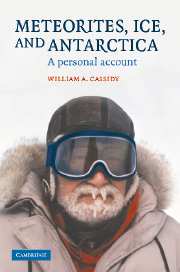PART II - ANSMET pays off: field results and their consequences
Published online by Cambridge University Press: 06 August 2009
Summary
I am lucky to have induced my colleague, Bob Fudali, to review early drafts of each chapter of this book. One of Bob's major talents is a fine critical faculty. Another is a mindset that allows him to speak without fear or favor. I recently received the following note from him (tucked into a Christmas card).
On several occasions I've gently tried to tell you that you are seriously overestimating the importance of the vast majority of the meteorites found in Antarctica. That is not to say we shouldn't continue to collect them only that we should not become overly enamored of our own importance (as reflected by the ‘lsingular importance’ of the antarctic meteorites). I will, of course, continue to bring this to your attention.
A characteristic typical of most of us is to be overly impressed with the value of our own research, and I do not claim immunity from this failing. If I give an impression of excessive pride in the following chapters, even after Bob's stern admonition, then I apologize, but let me also point out to the reader that he/she has been warned …
The total of all meteorite specimens recovered from Antarctica by US, Japanese and European teams now numbers somewhere in the neighborhood of 30 000. Among these are a few lunar samples that fell as meteorites after being blasted off the moon as a result of collisions with asteroids.
- Type
- Chapter
- Information
- Meteorites, Ice, and AntarcticaA Personal Account, pp. 99 - 102Publisher: Cambridge University PressPrint publication year: 2003



